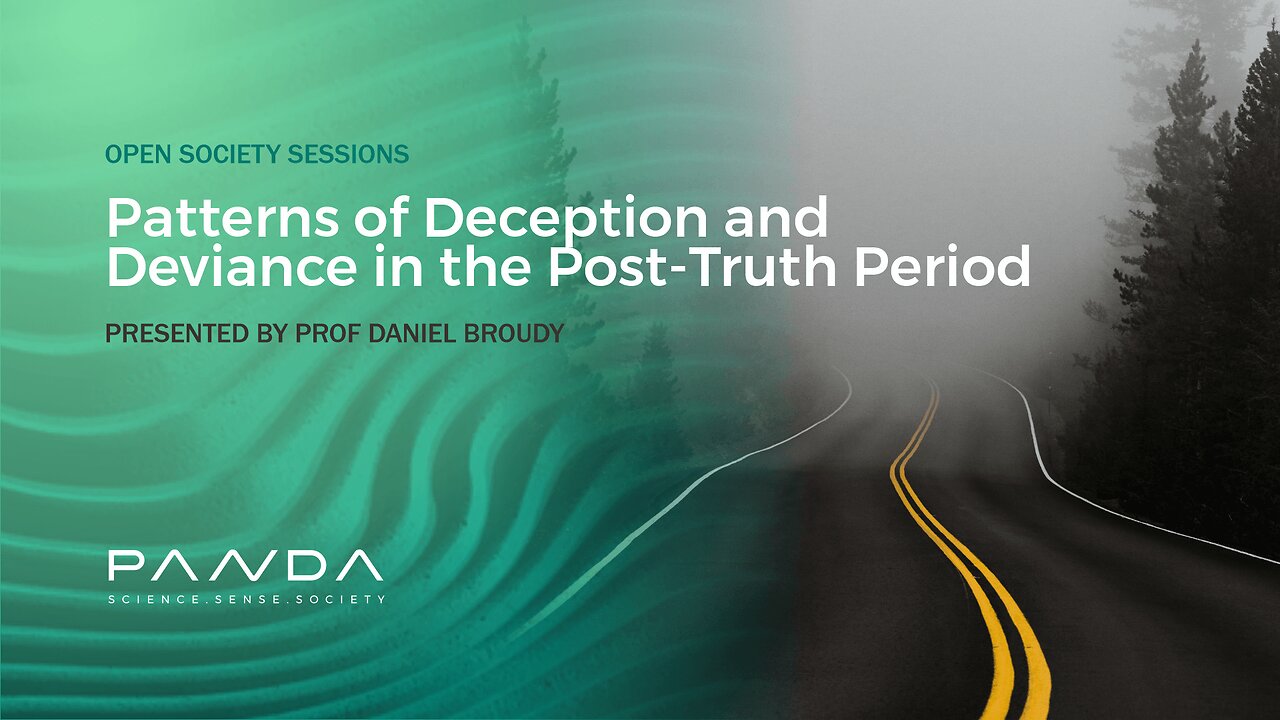Premium Only Content

Patterns of Deception and Deviance in the Post-Truth Period | Prof Daniel Broudy
With the Covid-19 theatre of global tragedy in apparent intermission, audiences everywhere may be speculating what new players and plotlines will appear on the world stage for Act II. Could a new viral outbreak “that’ll really get attention” (https://www.bitchute.com/video/tANGAQ9aCu6E/) be elemental to the rest of the script or will some other “catastrophic and catalyzing event” (https://www.theguardian.com/politics/2003/sep/06/september11.iraq) stand in for the famous deadly viral vectors of disease? This presentation draws upon scholarship in communication theory and cognitive science as an effort to unfold and clarify the various ways in which deceptions are carried out by powerful organizations in the public discourse. Refining our powers of observation so as to recognize the major patterns of deception, it is argued, will have positive effects in our attempts to build solid intellectual self-defenses against further propaganda campaigns.
Daniel Broudy is Professor of Applied Linguistics at Okinawa Christian University. He holds a doctorate in applied psycholinguistics and undertakes research on the signs, symbols, images, and colors used as rhetorical tools to engineer mass consent. His primary interests are on the modification of perception and emotion through the deployment of agitation and integration propaganda. He is a coauthor of Okinawa Under Occupation (Palgrave, 2017) and a coeditor for The Propaganda Model Today: Filtering Perception and Awareness (Westminster, 2018). He also serves as a coeditor for Propaganda in Focus and as a research associate with the International Interdisciplinary Research Team.
The Covid event has revealed that it was about more than just public health and the political, economic and societal aspects of the response are of far greater significance than the virus itself. There remains a continued drive toward the transformation of our societies in ways that threaten democracy and our existing ways of life. Open Society Sessions aim to examine the political, societal and economic dimensions of our recent experience and analyse developments in the future.
Support our work: https://www.pandata.org/donate
-
 37:07
37:07
PANDA | Science. Sense. Society.
3 months agoDissolving Illusions: Disease, Vaccines, and The Forgotten History - Part 2 | Roman Bystrianyk
1.13K2 -
 10:17
10:17
Dermatologist Dr. Dustin Portela
2 days ago $16.41 earnedOlay Cleansing Melts: Dermatologist's Honest Review
116K6 -
 1:02:20
1:02:20
Trumpet Daily
2 days ago $36.49 earnedObama’s Fake World Comes Crashing Down - Trumpet Daily | Dec. 20, 2024
74.9K52 -
 6:29
6:29
BIG NEM
1 day agoCultivating God Mode: Ancient Taoist NoFap Practices
59.8K9 -
 30:53
30:53
Uncommon Sense In Current Times
2 days ago $10.09 earned"Pardon or Peril? How Biden’s Clemency Actions Could Backfire"
71.9K5 -
 40:01
40:01
CarlCrusher
1 day agoSkinwalker Encounters in the Haunted Canyons of Magic Mesa - ep 4
67.3K5 -
 59:44
59:44
PMG
2 days ago $8.91 earned"BETRAYAL - Johnson's New Spending Bill EXPANDS COVID Plandemic Powers"
72.1K41 -
 6:48:50
6:48:50
Akademiks
22 hours agoKendrick Lamar and SZA disses Drake and BIG AK? HOLD UP! Diddy, Durk, JayZ update. Travis Hunter RUN
192K33 -
 11:45:14
11:45:14
Right Side Broadcasting Network
10 days agoLIVE REPLAY: TPUSA's America Fest Conference: Day Three - 12/21/24
374K30 -
 12:19
12:19
Tundra Tactical
23 hours ago $13.57 earnedDaniel Penny Beats Charges in NYC Subway Killing
82.5K16